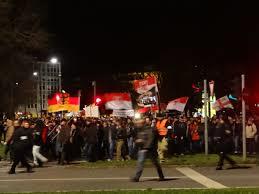
While much of the far-right targets Islam as a foreign and undesirable religion, Muslims and ex-Muslims are “increasingly prominent” in the West European far right groups, bringing a new spirituality to this often secular movement, writes Julian Gopffarth and Esra Ozyurek in the journal Ethnicities (online in June, 2020). When most far right groups and leaders have referred to religion it has usually been about claiming a Christian heritage (or a Pagan identity in some cases), even though actual Christian belief and practice has been found to be weak. The researchers look at the case of the German far right group AfD (Alternative for Germany), which has recently started Jewish and now Muslim-background groups to reach new demographics with its populist and nationalist message. They find that the number of Muslim-background members have been growing, with books and other publications authored by them becoming influential in far-right networks. While ex-Muslims are valued in these groups for providing an insiders’ knowledge of Islam, practicing Muslims depict their involvement in the far right as showing the “potential of Islam for a revived German nationalism,” Gopffarth and Ozyurek write.
The Muslim-background intellectuals tend to be of Turkish, Kurdish, and other Middle Eastern origins as well as German by birth and are demographically diverse. In examining the writings of 14 Muslim-background intellectuals, the authors find that such writers and activists as Seyran Ates and sociologist Necla Kelek are strongly anti-Muslim, drawing a stark contrast between the liberalism rationality of German society versus what  they see as the Eastern irrationality and barbarism of Islamic society.
they see as the Eastern irrationality and barbarism of Islamic society.
Other activists, such as Ahmad Mansour, describe themselves as Muslim but promote a radical reform of Islam, especially in the area of gender equality and the prevention of radicalization. Such radical reformers believe that Muslims in Germany will have to undergo their own version of the sexual revolution to overcome an authoritarian and repressive identity and “become mature citizens ready for democracy.” Compared to these two groups, other networks are more devoutly Muslim and are becoming more visible in far-right circles. Represented by such intellectuals as Ai-Bakr and Eren Guverci and the Al Muribitun movement, this network views the spiritual potential of Islam complementing the essential spirituality of the German people, seeking to revive the view (held by some Nazis) that Islam is a more vital and heroic religion than Christianity and rationalism. The last network consists of ex-Muslims who are the most adamantly anti-Islamic (and illiberal) as they celebrate the German nation. The article concludes that the liberal and illiberal ways in which ways the far-right responds to Islam shows how it is pursuing new recruits for taking up a German nationalist identity.
(Ethnicities, https://journals.sagepub.com/home/etn)